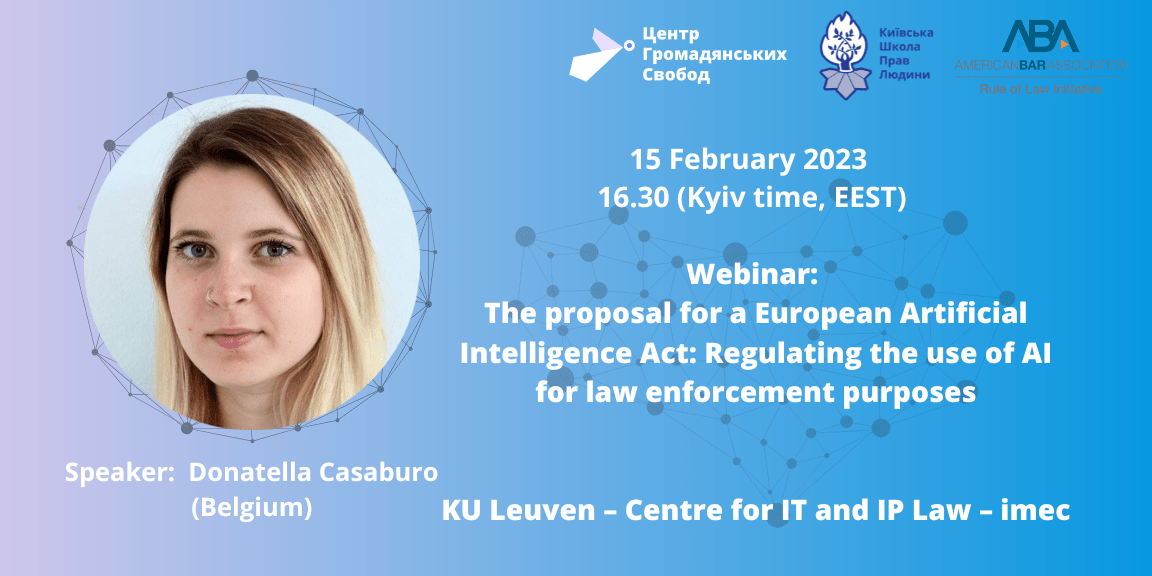The proposal for a European Artificial Intelligence Act: Regulating the use of AI for law enforcement purposes

In a framework of the joint Center for Civil Liberties & ABA ROLI project “Promoting Internet Freedom in Ukraine” on 15 February 2023 CCL conducted a lecture on the proposal for a European Artificial Intelligence Ac and its provisions for the use of AI for law enforcement purposes.
Syllabus: Police and law enforcement agencies (LEAs) are currently deploying artificial intelligence (AI) in their daily operations, to improve both their pre-emptive and reactive practices. The use of AI-assisted tools in the law enforcement context has sparked great criticism, given the possible human rights implications.In April 2021, the European Commission published the draft of a regulation containing harmonized rules on artificial intelligence (AI Act).
When adopted, the AI Act will impose binding obligations on providers and users of AI systems with the twofold aim of ensuring the safety of the AI-products and enhancing the protection of fundamental rights. The regulation will importantly affect also the possibilities and capabilities of LEAs.The lecture will be divided in three parts. First, a brief technical introduction on AI will be given. Then, an overview of the main human rights concerns deriving from the LEA-use of AI will be presented. Finally, the EU Commission’s AI Act proposal will be thoroughly analyzed.
Speaker: Donatella CasaburoThe Centre for IT & IP Law is a research center at the Faculty of Law of the University of Leuven (KU Leuven), with currently a staff of over 80 researchers specialized in legal and ethical aspects of IT innovation and intellectual property.Donatella holds a cum laude Master’s degree in Law from the University of Trieste, where she wrote her thesis on the relationship between the UN and the EU counter-terrorism measures and the right to privacy. She is currently finalizing an Advanced LL.M. in IP/IT Law at KU Leuven, with a thesis in the field of privacy engineering. Prior to joining CiTiP, Donatella worked as Advocacy Officer and Policy Analyst for a law firm specialized in government affairs.
According to Margrethe Vestager, Vice-President of the European Commission for Digital Transformation: “By proposing these rules, the EU is showing leadership in developing legislation that will guarantee trust in artificial intelligence. By setting such standards, we can pave the way for the ethical use of AI technologies around the world and ensure that the EU remains competitive in this field. Future-oriented and innovation-friendly, our rules apply where they are most needed: when it comes to the security and fundamental rights of our citizens“.
The new rules provide criteria for assessing the risks of using artificial intelligence technologies and divide all technologies in this area into 3 groups:
Unacceptable risk technologies – all artificial intelligence systems that pose a threat to security, lifestyle, or human rights, such as systems or applications that allow for the manipulation of human behavior, or technologies that allow authorities to segment society based on “social ratings” generated by artificial intelligence systems.
High-risk technologies are artificial intelligence systems used in public transportation and other critical infrastructure, education and training, security and employment, public order, migration and asylum, justice, and other areas that directly affect the safety of individuals or human rights, including the right to adequate social services, quality education, or the right to decent work. Such artificial intelligence systems will only be allowed to be used after a thorough review by EU regulators. In addition, facial recognition technologies are also classified as “high risk,” and their use by law enforcement agencies will be permitted only by court order.
Low-risk technologies include chatbots, video games, computer spam filters, and other technologies that do not pose a threat to the security or rights of users. The use of such technologies will not require additional authorization.
Additional reading materials on AI
- An Artificial Intelligence System Suggests Arbitrariness of the Death Penalty
- What Happens When Police Use AI to Predict and Prevent Crime?
- How Artificial Intelligence In Policing Helps Crime Detection
- How Will Artificial Intelligence Affect Policing and Law Enforcement?
- Police Use of Artificial Intelligence: 2021 in Review
- Artificial Intelligence and Robotics for Law Enforcement
- The State of AI in Policing
- The never-ending quest to predict crime using AI
- Using Artificial Intelligence to Address Criminal Justice Needs (pdf)
- This report on AI for law enforcement is the most recent product of the collaboration on AI between the. Innovation Centre of the International Criminal Police – INTERPOL (pdf)
- Artificial intelligence and policing: It’s a matter of trust
- Artificial Intelligence and Policing: First Questions (pdf)
- Surveillance and Predictive Policing Through AI
- Machine Learning Algorithms and Police Decision-Making
- EU: the AI Act
![]() Registration for the next events: https://forms.gle/7Xa4D7C5QpQdbbfJA
Registration for the next events: https://forms.gle/7Xa4D7C5QpQdbbfJA

